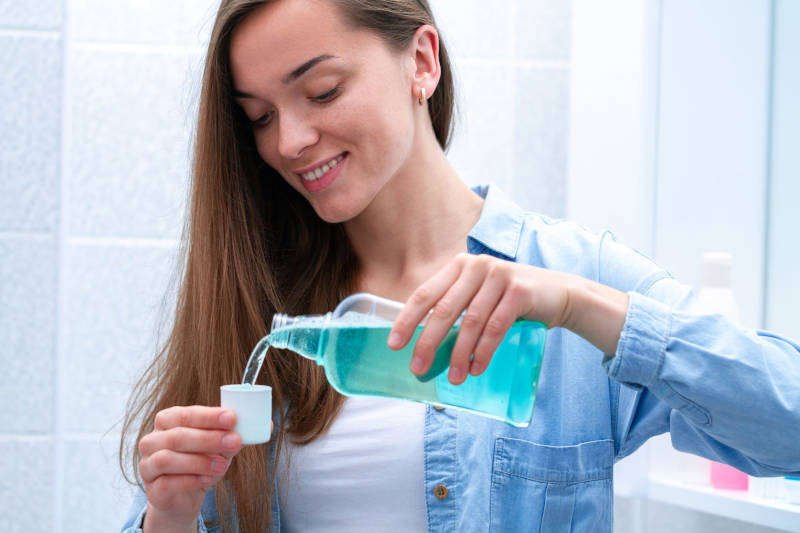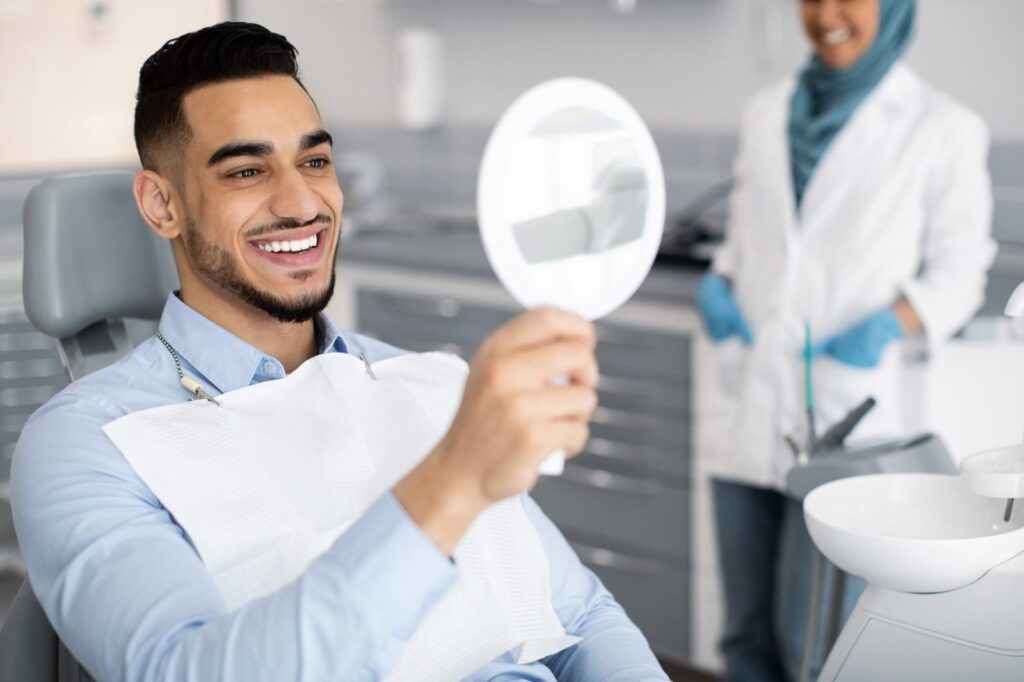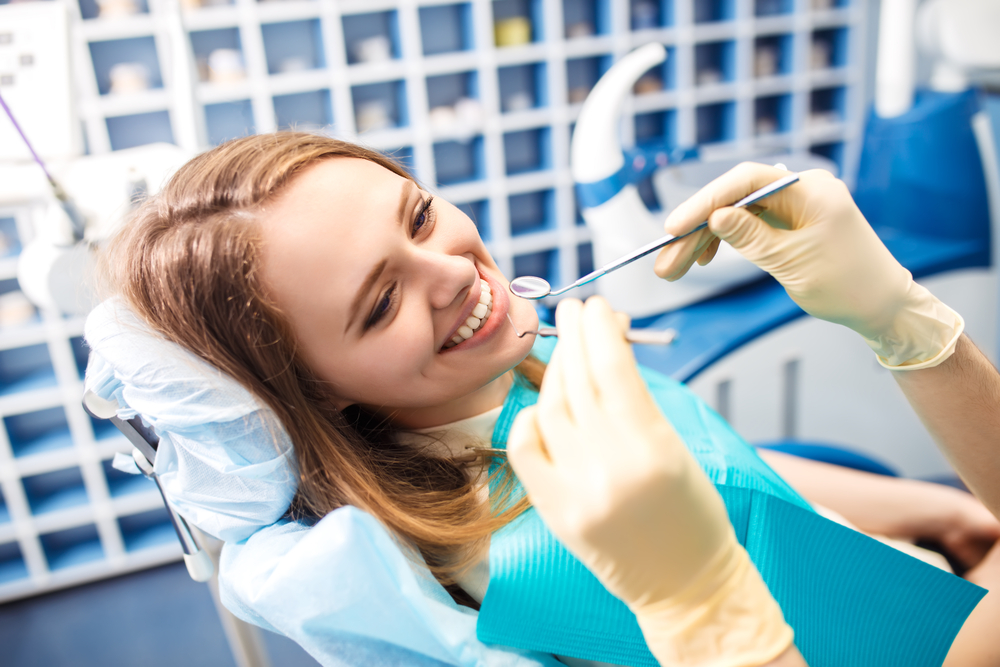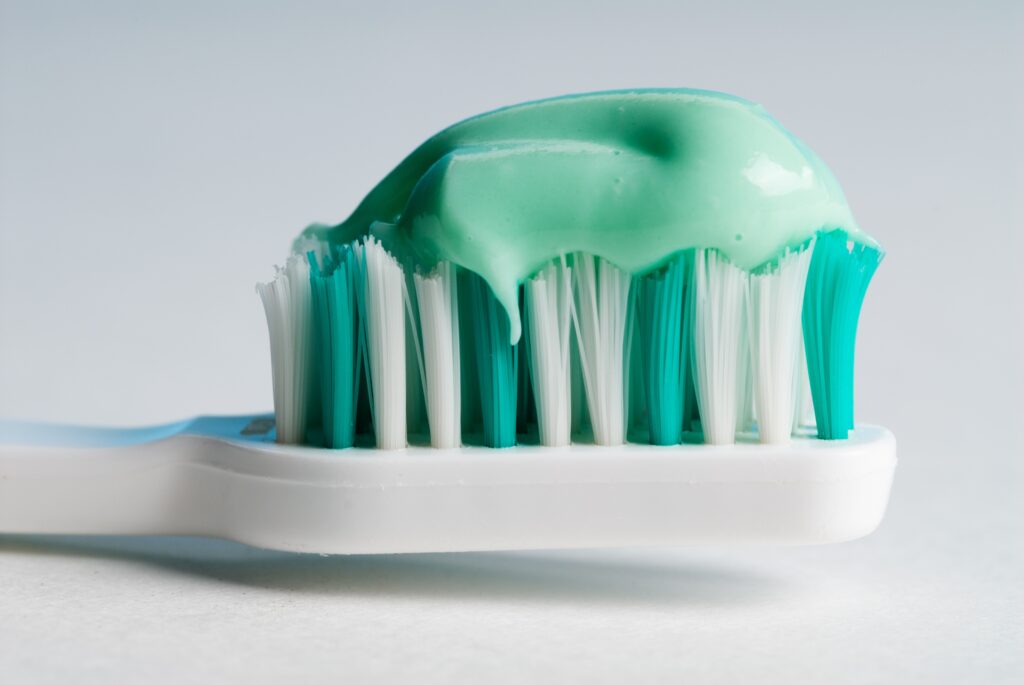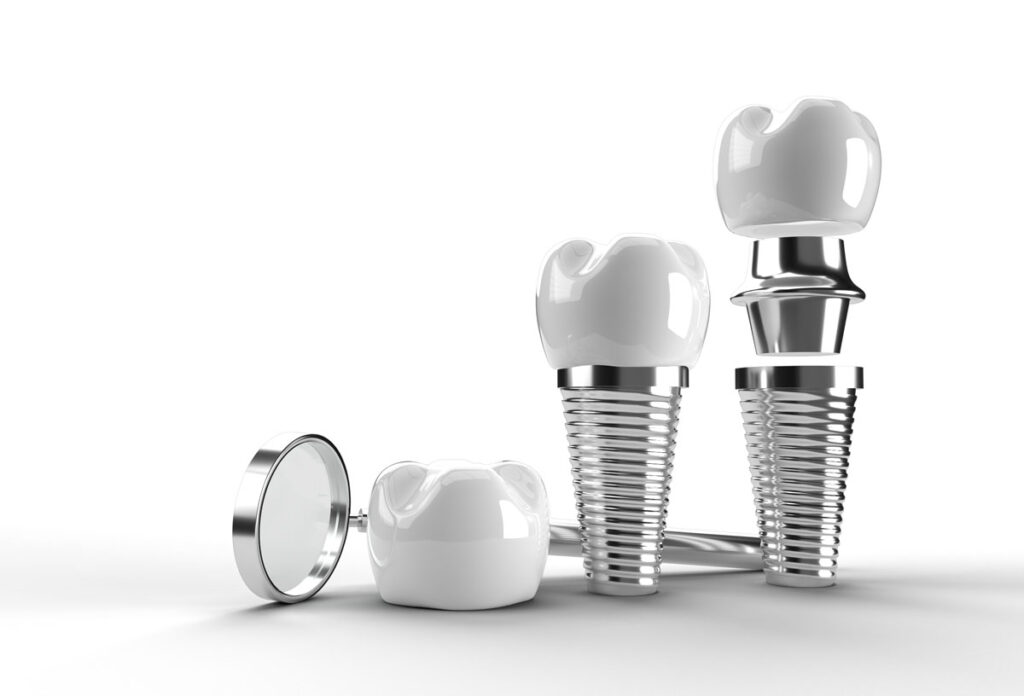We’ve all seen the mouthwash commercials where happy actors use mouthwash to combat plaque, germs, cavities, and other unwanted visitors. The result? A dazzling smile and a healthy mouth. Or so those commercials tell us. Does mouthwash work? The short answer is yes. But not all mouthwash products are the same. There are different types of oral rinses available which target a variety of dental health issues, from bad breath to gingivitis.
Below, we’ll deep dive into mouthwash, what it does, the different kinds of mouthwash available, and how it can improve your dental hygiene. Keep reading for a comprehensive overview or skip to the section you’d like to learn more about.
- What is Mouthwash?
- What are the Benefits of Mouthwash?
- Types of Mouthwash
- Top Dentist-Recommended Mouthwash Brands
- How to Properly Use Mouthwash
- Conclusion: Does Mouthwash Really Work?
What Is Mouthwash?
Let’s start with the basics: what is mouthwash exactly? And how does mouthwash work? Mouthwash — sometimes also called mouthrinse — is an oral liquid rinse that helps clean your mouth, gums, and teeth. Most mouthwash liquids have an antiseptic which kills off the bacteria living in your mouth, gums, and teeth.
Most commercially-available mouthwashes will contain the following ingredients:
- Detergents: Detergents help remove food debris and loosen up any plaque stuck to your teeth.
- Alcohol: Mouthwash alcohol is used to kill off any germs that might lead to bad breath or tooth decay. Alcohol-free mouthwash will have other antimicrobial agents in lieu of alcohol.
- Preservatives: Preservatives help keep the mouthwash fresh and prevent bacteria from growing in the mouthwash.
- Flavours: Flavors are added for taste and color.
- Water: Water is usually an added element because it acts as a solvent for the other mouthwash ingredients.
What Are the Benefits of Mouthwash?
While brushing your teeth and flossing helps get rid of food debris and plaque, using mouthwash can be an added tool in your oral hygiene arsenal. There are a couple of caveats to understand before using mouthwash, however. Let’s look at the benefits and drawbacks below.
Benefits
Freshens breath: Mouthwash can make your mouth feel fresher and get rid of that lingering coffee breath. Many mouthwashes include mint and other flavors that leave your breath smelling extra fresh.
May reduce plaque and gingivitis: Mouthwash, especially antiseptic mouthwash, helps reduce the amount of bacteria in your mouth that can lead to dental issues.
Fends off cavities and tooth decay: This is especially true if you use a mouthwash with fluoride. When used in a mouthwash, fluoride combines with your saliva to strengthen your teeth and helps protect them from plaque and sugars.
Drawbacks
Dehydrating: If you have dry mouth, mouthwashes with alcohol can be overly drying. Instead, opt for an alcohol-free variety.
Irritating: If you use a mouthwash with alcohol, the liquid can irritate any sensitive spots such as canker sores in your mouth or other wounds. Again, if you have any sensitivities or wounds in your mouth, it’s best to opt for an alcohol-free mouthwash or get your dentist’s recommendation.
Masks the true cause of bad breath: Although mouthwash can provide a minty fresh feel for your mouth, it doesn’t target the real cause of bad breath. The only way to ensure that you’ll have pearly whites and a healthy smile is by brushing, flossing, and seeing a dentist regularly. Mouthwash can lull you into a false sense of security since it provides that “clean” feeling. But remember, mouthwash might get rid of your coffee breath, but it’s not the cure-all for the causes of bad breath.
Types of Mouthwash
Today’s consumer has plentiful mouthwash options. But not all mouthwashes are created equally. We’ve put together a list of the most common types of mouthwash and what they can do for your oral health when used properly in conjunction with other good habits like brushing and flossing your teeth daily.
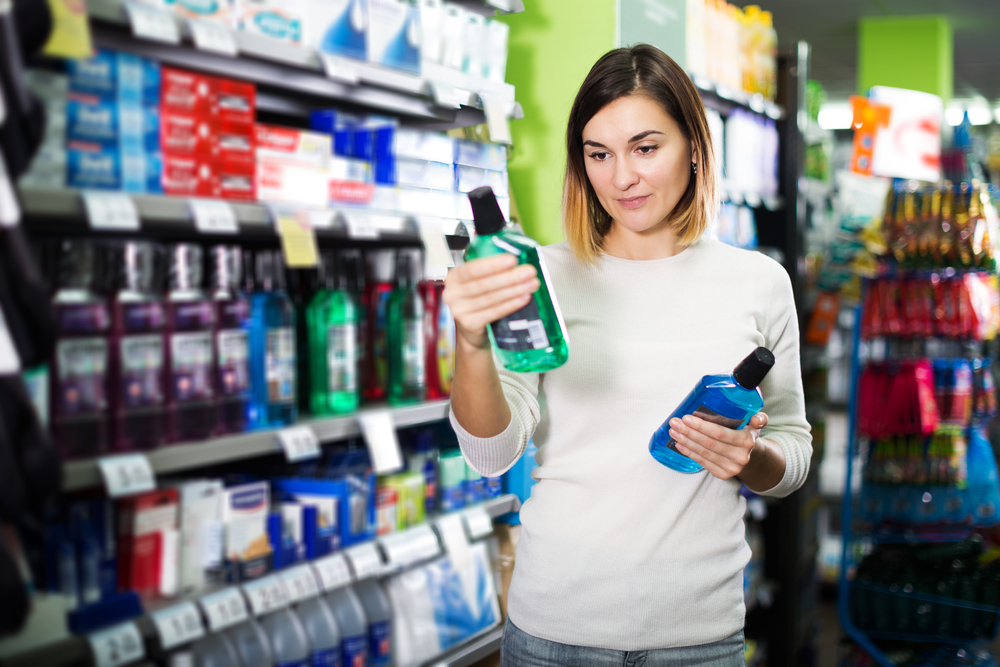
General Breath-Freshening
Nobody wants bad breath and a funky mouth which is why breath-freshening mouthwashes are a popular option. It’s still a good idea to opt for a breath-freshening mouthwash with antiseptic ingredients, so keep that in mind when you’re comparing labels.
Mouthwash for Gingivitis
If you have gingivitis or other gum issues, you can get mouthwash that helps combat gum disease. Again, a mouthwash alone won’t solve your gum issues. It’s important to have consistent professional dental care in addition to keeping up with the basics like brushing and flossing. This is especially true if you suddenly notice red or irritated gums, bleeding gums, or your gums are receding from your teeth.
Mouthwash for Sensitive Teeth
The shooting pain of sensitive teeth is no fun to deal with. Besides a sensitive teeth toothpaste, you can also get a mouthwash specifically made for sensitive teeth. It’s important to choose an oral rinse without alcohol because alcohol can cause irritation or pain if you have sensitivity issues.
In most cases, dental sensitivity is due to the erosion of tooth enamel, so a mouthwash with fluoride might be a good choice since it can help remineralize your teeth.
Mouthwash for Whitening
In terms of cosmetic mouthwash, whitening mouthwash is very popular. But does whitening mouthwash work? Whitening mouthwash contains a bleaching agent, usually hydrogen peroxide, to whiten teeth. And although these types of mouthwashes can help lighten your teeth, hydrogen peroxide can damage your teeth enamel.
Look for mouthwash with lower levels of hydrogen peroxide to minimize any possible damage. Or, swish the whitening mouthwash for a shorter time period to reduce how long your teeth are exposed.
Fluoride Mouthwash
Fluoride mouthwash can help protect teeth from tooth decay, cavities, and other signs of poor dental health. Does fluoride mouthwash work to strengthen teeth, too? Yes, this type of mouthwash can help remineralize your teeth, making them stronger and less porous. Fluoride can also be part of the ingredients of toothpaste and might be in your tap water as well. With that information in mind, it’s important that you don’t swallow any, because too much fluoride can be toxic.
Top Dentist-Recommended Mouthwash Brands
Does mouthwash work? Yes. But some are better than others.
Make sure to look for mouthwashes that have been approved by the American Dental Association (ADA). The ADA Seal of Acceptance means that the product meets safety and efficacy standards. You can get more information at ADA.org.
Here are some top oral rinse picks:
- Best General Mouthwash: Therabreath Fresh Breath Oral Rinse
- Best for Gum Recession: Natural Dentist Healthy Gums Mouthwash
- Best Fluoride Mouthwash: Toms Main Whole Natural Mouthwash
- Best Sensitive Teeth Mouthwash: CloSYS Sensitive Mouthwash
- Best for Bad Breath: Oral-B Breath Therapy Mouthwash
For more mouthwash recommendations, you can check out Healthline.com or ask your dentist for their top pick.
How to Properly Use Mouthwash
Mouthwash is most effective when you use it after you’ve brushed and flossed. Here are the steps to follow to get the most from your mouthwash.

Step 1: Brush your teeth.
Before you use mouthwash, make sure that you’ve brushed and flossed your teeth. If you use a fluoride toothpaste, wait before using a mouthwash instead of immediately following up with it. Mouthwash can wash away the fluoride in your toothpaste.
Step 2: Portion out the mouthwash.
Pour your mouthwash into the cap or use a plastic measuring cup. Measure out the amount of liquid as instructed on the label. For most types of mouthwash, you’ll use between three and five teaspoons.
Step 3: Swish and rinse.
Put the mouthwash into your mouth and swish it around for at least 30 seconds. Don’t swallow it.
Step 4: Spit out the mouthwash.
After you’ve swished around the mouthwash for 30 seconds, spit it out into the sink.
Does mouthwash work for anything else besides cleaning up your teeth and gums? Well, we’re glad you asked. Besides cleaning your mouth, there are also many alternative uses for mouthwash. For example, if you have an alcohol-based and sugar-free mouthwash, you can use it as a hand sanitizer in a pinch. You can also use an alcohol-based mouthwash as an antiseptic for cuts and as an anti-itch topical solution for a poison ivy rash.
Another use for mouthwash is cleaning your garbage disposal with it! Just pour a half cup of your mouthwash down the disposal to get a fresher, better-smelling kitchen.
Conclusion: Does Mouthwash Really Work?
Although mouthwash is an important part of a good at-home oral hygiene regime, the benefits of using mouthwash don’t replace the need for regular dentist appointments. It’s critical that you get professional dental cleanings every six to twelve months for optimal oral health. Appointments with a dental professional can help prevent and quickly address dental issues.
Worried about the financial burden of taking care of your teeth properly? If so, consider signing up for a dental savings plan. Dental savings plans are separate from insurance and act as a savings membership that allows you to get discounts on your dental treatments. With a dental savings plan, dental care is much more affordable, so you can ensure you can get the treatments you need to keep your smile healthy for years to come.

